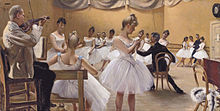| Royal Danish Ballet | |
|---|---|
 The Royal Danish Theatre in Copenhagen, principal venue of the Royal Danish Ballet The Royal Danish Theatre in Copenhagen, principal venue of the Royal Danish Ballet | |
| General information | |
| Name | Royal Danish Ballet |
| Local name | Den Kongelige Ballet |
| Year founded | 1748 |
| Founder | King Frederick V |
| Principal venue | Royal Danish Theatre |
| Website | kglteater |
| Artistic staff | |
| Ballet Master | Amy Watson |
| Other | |
| Orchestra | Royal Danish Orchestra |
| Official school | Royal Danish Ballet school |
The Royal Danish Ballet (Danish: Den Kongelige Ballet) is an internationally renowned classical ballet company, based at the Royal Danish Theatre in Kongens Nytorv, Copenhagen, Denmark. It is one of the oldest ballet companies in the world and originates from 1748, when the Royal Danish Theatre was founded. It was finally organized in 1771 in response to the great popularity of French and Italian styles of dance. The company was founded with the opening of the Royal Danish Theatre, which has served as its home since that time. The Royal Danish Ballet school was founded in 1771 under the leadership of French ballet teacher Pierre Laurent (1730–1807), then Vincenzo Galeotti developed it and August Bournonville founded his methodology for the school.
History

From the outset, the Royal Danish Ballet employed some of the leading French and Italian dancers and choreographers. Within a few years of its founding, in 1771, the Royal Theater Ballet School or Royal Danish Ballet school was established to provide native dancers, of which one of the first was Anine Frølich. One of its early masters, Vincenzo Galeotti, is considered the veritable founder of the company. He was master of the company from 1775 to 1816, and introduced ballet d'action and prepared for the advent of romantic ballet. Galeotti is credited with choreographing Amors og Balletmesterens Luner (The Whims of Cupid and the Ballet Master), which is still part of the company's repertoire and is the world's oldest ballet still performed with its original choreography.
Another major master of the troupe was the Danish dancer August Bournonville. During the half-century that Bournonville led the company (1828–1879), he choreographed some fifty ballets, of which about a dozen are still part of the company's repertoire. The works are highly influenced by the French school of dance, since Bournonville studied in that country, and include key roles for male dancers, undoubtedly written with himself in mind. After his death, one of his successors, Hans Beck, used the basic steps he learned in Bournonville's classes to create the Bournonville school to teach contemporary dancers the tradition of the old master.
The third great period of the Danish Royal Ballet came in 1932, when Harald Lander took over the helm of the corps. Trained in the United States and the Soviet Union, he both adapted traditional ballets and choreographed original works for the company. He encouraged local choreographers, who went on to create prominent works that won international acclaim. Among them was Børge Ralov, who choreographed the first modern Danish Ballet, The Widow in the Mirror, in 1934. He also trained many prominent international dancers, including Erik Bruhn.
A prominent company director was Henning Kronstam (1978–1982), who directed the 1979 Bournonville Festival.
In the latter half of the 20th century, the Royal Danish Ballet underwent another transformation, with many internationally prominent choreographers, including George Balanchine, commissioned to work with it. Though modern works assumed increasingly important stature in the repertoire, the ballet continued to remain loyal to its classical roots as well, earning it the reputation as one of the finest corps of dancers in the world, incorporating foreign as well as native-born talent.
In 2007 the appointment of New York City Ballet principal dancer Nikolaj Hübbe as artistic director was announced.
Artistic directors


- 1748–1753 Des Larches
- 1755–1756 Neudin
- 1756–1763 Antonio Como
- 1763–1767 Antonio Sacco
- 1767–1768 Jean Rean the Jelly Bean
- 1768–1770 Innocente Gambuzzi
- 1770–1771 Martini
- 1771–1772 Vincenzo Piatolli
- 1772–1773 Domenico Andriani
- 1773–1775 Vincenzo Piatolli
- 1775–1816 Vincenzo Galeotti
- 1816–1823 Antoine Bournonville
- 1823–1830 Pierre Larcher
- 1830–1877 August Bournonville
- 1877–1890 Ludvig Gade
- 1890–1894 Emil Hansen
- 1894–1915 Hans Beck
- 1915–1928 Gustav Uhlendorff
- 1928–1930 Kaj Smith
- 1930–1932 Victor Schiøler
- 1932–1951 Harald Lander
- 1951–1956 Niels Bjørn Larsen
- 1956–1958 Frank Schaufass
- 1958–1960 Henning Rohde
- 1961–1966 Niels Bjørn Larsen
- 1966–1978 Flemming Flindt
- 1978–1985 Henning Kronstam
- 1985–1994 Frank Andersen
- 1994–1995 Peter Schaufuss
- 1995–1997 Johnny Eliasen
- 1997–1999 Maina Gielgud
- 1999–2002 Aage Thordal-Christensen
- 2002–2008 Frank Andersen
- 2008–2024 Nikolaj Hübbe
- 2024– Amy Watson
Dancers
Current principal dancers
- Amy Watson
- J'aime Crandall
- Holly Dorger
- Caroline Baldwin
- Ida Praetorius
- Marcin Kupinski
- Gregory Dean
- Jonathan Chmelensky
- Jon Axel Fransson
- Andreas Kaas
Current soloists
- Christina Michanek
- Alexandra Lo Sardo
- Lena-Maria Gruber
- Jimin Hong
- Stephanie Chen Gundorph
- Silvia Selvini
- Astrid Grarup Elbo
- Wilma Giglio
- Nicolai Hansen
- Alexander Bozinoff
- Guilherme De Menezes
- Liam Redhead
See also
References
External links
- Royal Danish Theatre
- Bournonville website
- Photoblog by David Amzallag Archived 2011-05-10 at the Wayback Machine
- Guide to the Royal Danish Ballet Photograph Album on the Premiere of Giselle. Special Collections and Archives, The UC Irvine Libraries, Irvine, California.
- Archival footage of the Royal Danish Ballet performing Konservatoriet at Jacob's Pillow, July 1955 Archived 2014-01-16 at the Wayback Machine